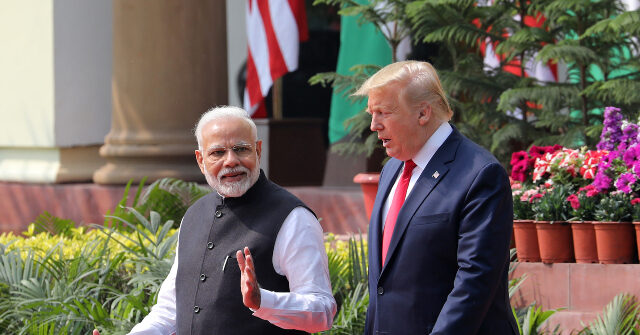India’s Asian News International (ANI) on Sunday quoted sources in New Delhi who said India has “dramatically increased its crude oil imports from the United States since President Donald Trump returned to the White House for his second term.”
“From January to June 25, India increased its imports of US average crude supplies by 51 per cent compared to the same period last year,” ANI’s sources said.
The trend is reportedly accelerating as India’s purchases of American crude jumped by 114 percent in the second quarter of 2025, putting almost $2 billion more in the pockets of U.S. exporters.
The third quarter was off to a good start as well, with a 21-percent increase in crude oil imports from the United States logged in July.
ANI’s sources expected 2025 to end up with a net increase of 150 percent in U.S. crude oil purchases, plus increased imports of other energy products, such as liquefied petroleum gas (LPG) and liquefied natural gas (LNG). LNG imports nearly doubled in 2024.
“Sources suggest this is just the beginning, with discussions underway for a major long-term LNG contract worth tens of billions of dollars,” ANI reported.
India is presently engaged in tough eleventh-hour trade negotiations with the United States, marked by a combination of combative public statements – including President Donald Trump telling India and Russia to “take their dead economies down together, for all I care” – and quiet constructive action behind the scenes.
India was outspokenly in favor of negotiating a broad trade agreement with the Trump administration as quickly as possible, but then frustrated U.S. negotiators by growing intransigent in the final stages of those negotiations, including adamant insistences on keeping protectionist agricultural tariffs in place and importing huge amounts of oil from Russia.
India has been buying Russian oil at deeply discounted prices ever since Moscow lost many of its old customers by invading Ukraine in 2022. The Trump administration is pressuring India to abandon its practices because oil income is a key funding stream for the Russian invasion.
Senior White House adviser Stephen Miller on Sunday bluntly accused India of underwriting Russia’s war in Ukraine.
“It is not acceptable for India to continue financing this war by purchasing the oil from Russia,” Miller said in a Fox News interview.
“People will be shocked to learn that India is basically tied with China in purchasing Russian oil. That’s an astonishing fact,” he said.
Two Indian government sources told Reuters that India will keep buying Russian oil, even if Trump makes good on his threat to impose up to 100 percent penalties on Moscow’s customers, in addition to the 25 percent tariff on Indian exports to the United States he imposed last week.
“These are long-term oil contracts. It is not so simple to just stop buying overnight,” one of Reuters’ sources said. The other argued that India has been fending off a global surge in oil prices by purchasing much of Russia’s supply, to the benefit of consumers in the U.S. and elsewhere.
Even as Indian officials made official and unofficial pronouncements that imports from Russia would continue, Indian state refiners quietly stopped purchasing Russian oil in July, cutting off about 40 percent of the flow from Russia to India. The indefinite suspension was ostensibly prompted by shrinking discounts from Russia, prompting Indian state refineries to go shopping in the Middle East and West Africa for better – and perhaps less politically explosive – deals on crude.
Combined with the news of surging imports from the United States, the actions of state refiners could represent a compromise with Trump’s demands: a significant reduction in purchases from Russia, coupled with a pleasing increase in purchases from American suppliers. New Delhi could also be playing for time, hoping for other factors to end the Ukraine conflict before India is forced to make a painful decision that could alienate its longtime allies in Russia.
On Sunday, India’s top state-owned refiner, the Indian Oil Corporation (IOC), announced a spot purchase of 4.5 million barrels of crude oil from the U.S., plus another 2.5 million from Canada and Abu Dhabi. Trade industry sources said this spot purchase was, in part, meant to replace reduced imports from Russia.
Read the full article here


